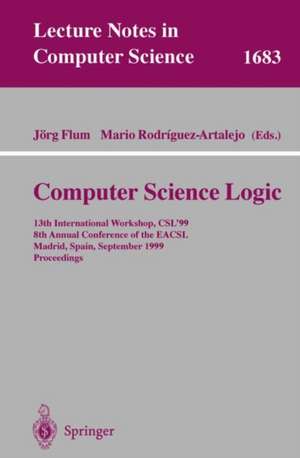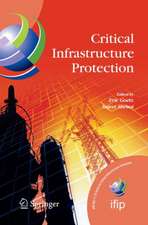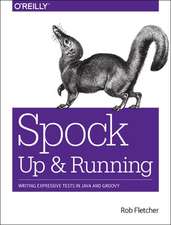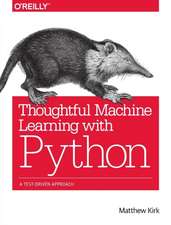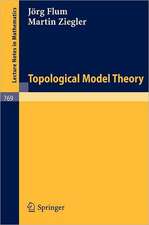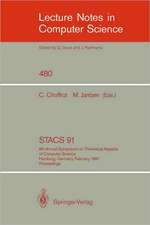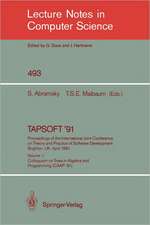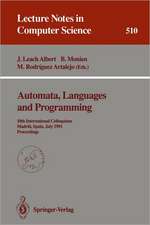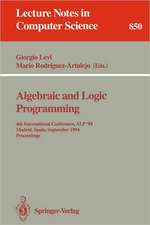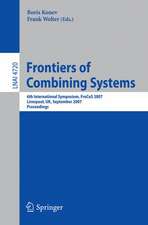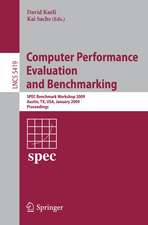Computer Science Logic: 13th International Workshop, CSL'99, 8th Annual Conference of the EACSL, Madrid, Spain, September 20-25, 1999, Proceedings: Lecture Notes in Computer Science, cartea 1683
Editat de Jörg Flum, Mario Rodriguez-Artalejoen Limba Engleză Paperback – 8 sep 1999
Din seria Lecture Notes in Computer Science
- 20%
 Preț: 1061.55 lei
Preț: 1061.55 lei - 20%
 Preț: 307.71 lei
Preț: 307.71 lei - 20%
 Preț: 438.69 lei
Preț: 438.69 lei - 20%
 Preț: 579.30 lei
Preț: 579.30 lei -
 Preț: 410.88 lei
Preț: 410.88 lei - 17%
 Preț: 427.22 lei
Preț: 427.22 lei - 20%
 Preț: 596.46 lei
Preț: 596.46 lei - 15%
 Preț: 448.04 lei
Preț: 448.04 lei - 20%
 Preț: 353.50 lei
Preț: 353.50 lei -
 Preț: 389.49 lei
Preț: 389.49 lei - 20%
 Preț: 309.90 lei
Preț: 309.90 lei - 20%
 Preț: 645.28 lei
Preț: 645.28 lei - 20%
 Preț: 763.23 lei
Preț: 763.23 lei - 15%
 Preț: 580.46 lei
Preț: 580.46 lei - 20%
 Preț: 310.28 lei
Preț: 310.28 lei - 20%
 Preț: 655.02 lei
Preț: 655.02 lei - 20%
 Preț: 1183.14 lei
Preț: 1183.14 lei - 20%
 Preț: 340.32 lei
Preț: 340.32 lei -
 Preț: 449.57 lei
Preț: 449.57 lei - 20%
 Preț: 591.51 lei
Preț: 591.51 lei - 18%
 Preț: 938.83 lei
Preț: 938.83 lei - 20%
 Preț: 337.00 lei
Preț: 337.00 lei - 20%
 Preț: 649.50 lei
Preț: 649.50 lei - 20%
 Preț: 607.40 lei
Preț: 607.40 lei - 20%
 Preț: 1414.79 lei
Preț: 1414.79 lei - 20%
 Preț: 1024.44 lei
Preț: 1024.44 lei - 20%
 Preț: 583.40 lei
Preț: 583.40 lei - 20%
 Preț: 453.32 lei
Preț: 453.32 lei - 20%
 Preț: 575.49 lei
Preț: 575.49 lei - 20%
 Preț: 1075.26 lei
Preț: 1075.26 lei - 20%
 Preț: 585.88 lei
Preț: 585.88 lei - 20%
 Preț: 825.93 lei
Preț: 825.93 lei - 17%
 Preț: 360.20 lei
Preț: 360.20 lei - 20%
 Preț: 763.23 lei
Preț: 763.23 lei - 20%
 Preț: 340.32 lei
Preț: 340.32 lei - 20%
 Preț: 504.58 lei
Preț: 504.58 lei - 20%
 Preț: 369.13 lei
Preț: 369.13 lei - 20%
 Preț: 580.93 lei
Preț: 580.93 lei - 20%
 Preț: 343.62 lei
Preț: 343.62 lei - 20%
 Preț: 350.21 lei
Preț: 350.21 lei - 20%
 Preț: 583.40 lei
Preț: 583.40 lei - 20%
 Preț: 583.40 lei
Preț: 583.40 lei - 15%
 Preț: 438.59 lei
Preț: 438.59 lei - 20%
 Preț: 341.95 lei
Preț: 341.95 lei - 20%
 Preț: 238.01 lei
Preț: 238.01 lei - 20%
 Preț: 538.30 lei
Preț: 538.30 lei
Preț: 347.40 lei
Preț vechi: 434.26 lei
-20% Nou
Puncte Express: 521
Preț estimativ în valută:
66.50€ • 72.25$ • 55.89£
66.50€ • 72.25$ • 55.89£
Carte tipărită la comandă
Livrare economică 22 aprilie-06 mai
Preluare comenzi: 021 569.72.76
Specificații
ISBN-13: 9783540665366
ISBN-10: 3540665366
Pagini: 600
Ilustrații: XII, 588 p.
Dimensiuni: 155 x 235 x 32 mm
Greutate: 0.83 kg
Ediția:1999
Editura: Springer Berlin, Heidelberg
Colecția Springer
Seria Lecture Notes in Computer Science
Locul publicării:Berlin, Heidelberg, Germany
ISBN-10: 3540665366
Pagini: 600
Ilustrații: XII, 588 p.
Dimensiuni: 155 x 235 x 32 mm
Greutate: 0.83 kg
Ediția:1999
Editura: Springer Berlin, Heidelberg
Colecția Springer
Seria Lecture Notes in Computer Science
Locul publicării:Berlin, Heidelberg, Germany
Public țintă
ResearchCuprins
Invited Papers.- Topological Queries in Spatial Databases.- The Consistency Dimension, Compactness, and Query Learning.- Descriptive and Parameterized Complexity.- Logical Specification of Operational Semantics.- Constraint-Based Analysis of Broadcast Protocols.- Contributed Papers.- Descriptive Complexity Theory for Constraint Databases.- Applicative Control and Computational Complexity.- Applying Rewriting Techniques to the Verification of Erlang Processes.- Difference Decision Diagrams.- Analysis of Hybrid Systems: An Ounce of Realism Can Save an Infinity of States.- Verifying Liveness by Augmented Abstraction.- Signed Interval Logic.- Quantitative Temporal Logic.- An Expressively Complete Temporal Logic without Past Tense Operators for Mazurkiewicz Traces.- Using Fields and Explicit Substitutions to Implement Objects and Functions in a de Bruijn Setting.- Closed Reductions in the ?-Calculus.- Kripke Resource Models of a Dependently-Typed, Bunched ?-Calculus (Extended Abstract).- A Linear Logical View of Linear Type Isomorphisms.- Choice Logic Programs and Nash Equilibria in Strategic Games.- Resolution Method for Modal Logic with Well-Founded Frames.- A NExpTime-Complete Description Logic Strictly Contained in C 2.- A Road-Map on Complexity for Hybrid Logics.- MonadicNLIN and Quantifier-Free Reductions.- Directed Reachability: From Ajtai-Fagin to Ehrenfeucht-Fraïssé Games.- Fixpoint Alternation and the Game Quantifier.- Lower Bounds for Space in Resolution.- Program Schemes, Arrays, Lindström Quantifiers and Zero-One Laws.- Open Least Element Principle and Bounded Query Computation.- A Universal Innocent Game Model for the Böhm Tree Lambda Theory.- Anti-Symmetry of Higher-Order Subtyping.- Safe Proof Checking in Type Theory with Y.- Monadic Presentations ofLambda Terms Using Generalized Inductive Types.- A P-Time Completeness Proof for Light Logics.- On Guarding Nested Fixpoints.- A Logical Viewpoint on Process-Algebraic Quotients.- A Truly Concurrent Semantics for a Simple Parallel Programming Language.- Specification Refinement with System F.- Pre-logical Relations.- Data-Refinement for Call-By-Value Programming Languages.- Tutorials.- Tutorial on Term Rewriting.- Tutorial on Interactive Theorem Proving Using Type Theory.
Caracteristici
Includes supplementary material: sn.pub/extras
